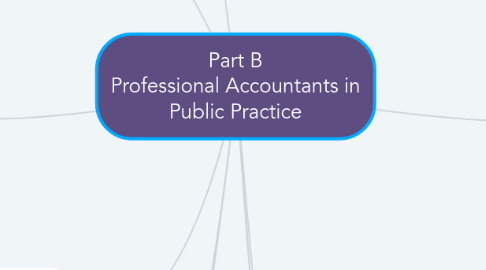
1. Professional Appointment
1.1. Client Acceptance
1.2. Engagement Acceptance
1.3. Changes in a Professional Appointment
2. Second Opinions
2.1. A professional accountant in public practice shall evaluate the significance of any threats and apply safeguards when necessary to eliminate them or reduce them to an acceptable level.
2.2. If the company or entity seeking the opinion will not permit communication with the existing accountant, a professional accountant in public practice shall determine whether, taking all the circumstances into account, it is appropriate to provide the opinion sought.
3. Fees & Other Types of Remunerations
3.1. a professional accountant in public practice may quote whatever fee is deemed appropriate.
3.2. Contingent fees are widely used for certain types of non-assurance engagements.
3.2.1. The nature of the engagement
3.2.2. The range of possible fee amounts
3.2.3. The basis for determining the fee
3.2.4. Whether the outcome or result of the transaction is to be reviewed by an independent third party
4. Marketing Professional Services
4.1. Solicits new work through advertising or other forms of marketing, there may be a threat to compliance with the fundamental principles
4.2. Shall not bring the profession into disrepute when marketing professional services
5. Custody of Client's Assets
5.1. Shall not assume custody of client monies or other assets unless permitted to do so by law
5.2. A professional accountant in public practice entrusted with money belonging to others shall therefore:
5.2.1. Keep such assets separately from personal or firm assets
5.2.2. use such assets only for the purpose for which they are intended
5.2.3. At all times be ready to account for those assets and any income, dividends, or gains generated, to any persons entitled to such accounting
5.2.4. Comply with all relevant laws and regulations relevant to the holding of and accounting for such assets
5.3. Appropriate inquiries about the source of such assets and consider legal and regulatory obligations.
6. Independence - Audit and Review Engagement
6.1. Addresses the independence requirements for audit engagements and review engagements, which are assurance engagements in which a professional accountant in public practice expresses a conclusion on financial statements.
7. Conflicts of Interest
7.1. Identify circumstances that could pose a conflict of interest
7.2. Evaluate the significance of any threats
7.3. Depending upon the circumstances giving rise to the conflict, safeguards should ordinarily include the professional accountant in public practice
7.3.1. Notifying the client of the firm’s business interest or activities that may represent a conflict of interest, and obtaining their consent to act in such circumstances;
7.3.2. Notifying all known relevant parties that the professional accountant in public practice is acting for two or more parties in respect of a matter where their respective interests are in conflict, and obtaining their consent to so act
7.3.3. Notifying the client that the professional accountant in public practice does not act exclusively for any one client in the provision of proposed services
7.4. Additional Safeguards
7.4.1. The use of separate engagement teams
7.4.2. Procedures to prevent access to information
7.4.3. Clear guidelines for members of the engagement team on issues of security and confidentiality
7.4.4. The use of confidentiality agreements signed by employees and partners of the firm
7.4.5. Regular review of the application of safeguards by a senior individual not involved with relevant client engagements
7.5. Where a conflict of interest poses a threat to one or more of the fundamental principles that cannot be eliminated or reduced to an acceptable level through the application of safeguards, the professional accountant in public practice should conclude that it is not appropriate to accept a specific engagement or that resignation from one or more conflicting engagements is required.
7.6. Where a professional accountant in public practice has requested consent from a client to act for another party (which may or may not be an existing client) in respect of a matter where the respective interests are in conflict and that consent has been refused by the client, then the professional accountant in public practice must not continue to act for one of the parties in the matter giving rise to the conflict of interest.
8. Gifts and Hospitality
8.1. May conclude that the offer is made in the normal course of business without the specific intent to influence decision making or to obtain information
8.1.1. Where gifts or hospitality are offered that a reasonable and informed third party would consider trivial and inconsequential
8.2. When the threats cannot be eliminated or reduced to an acceptable level through the application of safeguards, a professional accountant in public practice shall not accept such an offer.
9. Objectivity - All Services
9.1. Professional accountant in public practice who provides an assurance service shall be independent of the assurance client.
9.1.1. Independence of mind and in appearance
9.2. Existence of threats to objectivity
9.2.1. circumstances of the engagement
9.2.2. nature of the work
